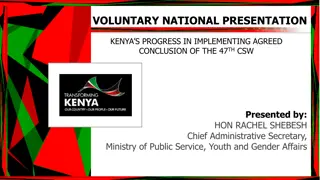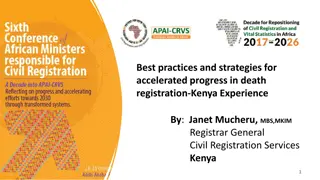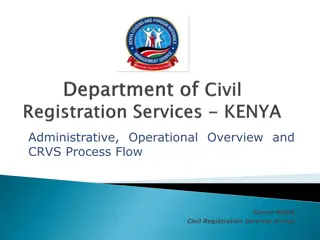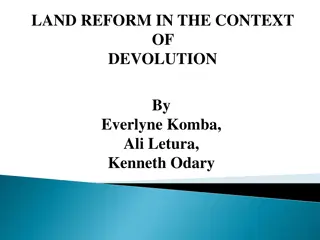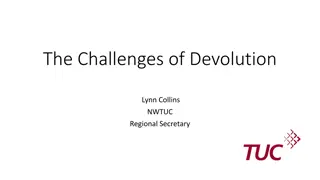Devolution in Kenya: Empowering Local Governance
The promulgation of the Constitution in 2010 marked a significant shift in Kenya's administrative structures through devolution. This decentralization process aims to promote social-economic development, provide accessible services to all Kenyans, and ensure equitable sharing of resources between National and County Governments. Effective devolution hinges on the transfer of adequate financial resources to County Governments and upholding core values of public engagement and resource distribution equity as outlined in the Constitution.
Download Presentation

Please find below an Image/Link to download the presentation.
The content on the website is provided AS IS for your information and personal use only. It may not be sold, licensed, or shared on other websites without obtaining consent from the author. Download presentation by click this link. If you encounter any issues during the download, it is possible that the publisher has removed the file from their server.
E N D
Presentation Transcript
S.N.A Presentation on Friday 15 Rt. Hon. Justin B. Speaker of the National Assembly of Kenya S.N.A Presentation on Friday 15th Rt. Hon. Justin B. Muturi Speaker of the National Assembly of Kenya thNov. 2017, Muturi, E.G.H, M.P Nov. 2017, , E.G.H, M.P
The Promulgation of the Constitution in 2010 fundamentally shifted administrative structures as well as the entire process of sharing national resources as a result of Devolution. The objectives of Devolution as stated in article 174 of the constitution among others include; to promote social economic development and the provision of proximate, easily accessible services to all Kenyans.
Further, to ensure equitable sharing of national and local resources throughout the country and to facilitate the decentralization of state organs, their functions and services from the capital of the country, Nairobi. Devolution as envisaged in the Constitution therefore requires the sharing of political administrative and fiscal powers between the National and County Governments.
One of the pillars of successful devolution is transfer of resources to the devolved units. County Governments can only implement their functions and responsibilities effectively if they have adequate financial resources. Pursuant to Article 95 (4)(a) of the Constitution, the National Assembly determines the allocation of national revenue between the National and County Governments. Chapter 12 of the 2010 Constitution lays out both detailed principles and elaborate procedures for making decisions about public finances.
The core values espoused in the constitution are reducible to two; public engagement throughout the process and equity in distribution of the resources. stipulates explicitly that the public finance system shall promote an equitable society and expenditure shall promote equitable development of the country including by making special provision for marginalized groups and areas. Particularly, Article 202 (1) reinforces that revenue raised nationally shall be shared equitably among national and county governments. public engagement throughout the process and equity in distribution of the resources. Article 201 of the constitution
Further, Article 203 sets out the criteria in determining the equitable shares concerning County Governments that is also embedded in all other Legislation; inter alia national interest, needs of the national government, need to ensure that county governments are able to perform the functions allocated to them. Also fiscal capacity and efficiency of county governments, the development and needs of the counties and economic disparities within and among counties and the need to remedy them. The need for affirmative action in respect to disadvantaged areas and groups.
The need for economic optimization of each county while providing incentives for each county to optimize its capacity to raise revenue and also the need for flexibility in responding to emergencies among others.
The National Assembly approves the Division of Revenue Bill every year which divides revenue raised nationally among the National and County Governments in accordance with the principles of public finance outlined in Article 201 and 203. The Budget and Appropriations Committee is charged with reviewing the bill to ensure they reflect the aforementioned principles in addition to the recommendations by the Commission on Revenue Allocation. In the Financial year 2017/18, the National Assembly approved allocation to County Governments Ksh.345 billion. This consists of Ksh.302 billion of equitable share of national government and Ksh.12.5 billion in conditional allocations from loans and grants for development.
The Equalization fund further enshrines the equity principle in the constitution. The fund channels a fixed share of annual revenues to marginalized areas in order to provide basic services ( roads, water, electricity and health) to marginalized areas to the extent necessary to bring the quality of those services in those areas to the level generally enjoyed by the rest of the nation. The implementation of the activities of the fund is envisaged to ensure equitable development in all counties. In this regard, the National Assembly approved the guidelines on the Administration of the equalization fund as espoused in Article 204 of the constitution. In the 2017/18 financial year, the National Assembly approved an allocation of Ksh.7.7 billion to the kitty. Currently Ksh.1.06 billion has been disbursed to counties in the current FY according to the controller of Budget.
The National Assembly in concurrence with the Senate approves the criterion for division of revenue raised by the national government between the national government and county government and among the county governments (Article 216 of the Constitution). The criterion is developed by the Commission for Revenue Allocation (CRA). Concerns have been raised on the appropriateness of the parameters used in the current revenue sharing formula hence regular consultations will be held between the two houses and CRA in the transition to the 3 generation formula. Concerns have been raised on the appropriateness of the parameters used in the current revenue sharing formula hence regular consultations will be held between the two houses and CRA in the transition to the 3rd generation formula. rd
The process of allocation of revenue to counties is a two tier process according to Article 203 (1) and (2) of the Constitution. Firstly we should estimate the costs of performing county functions. Second, to confirm if the allocation is more than 15% of the last audited and approved accounts. However, we need to pay more attention to delivering on our mandate to citizens given the limited resources available. This begs the question; is public resources being used for political expediency rather than public good?
Delay in transfer of devolved functions as outlined in the fourth schedule of the constitution is a major issue. Both the National and County Government should agree on a proper modality that will enable a systematic costing and transfer of all devolved functions which should be commensurate with transfer of resources. The piece meal transfer of functions has resulted to the blame game between the two levels of government due to lack of clarity of roles.
Failure by both the National and County Governments to meet their revenue targets is a threat to the sustainability of resourcing County Governments. In the Annual report for the FY 2014/15 the Controller of Budget stated that County Governments generated a total of Ksh.33.85 billion from local sources, which translates to 67.2% of the total revenue target that year. The biggest five Counties in revenue generation combined raised Ksh.19.94 billion while the rest 42 raised Ksh.13.91 billion. This indicated that County governments fell short of their set revenue targets. County Governments have seen demonstrations and public outcry over different revenue raising measures that have been adopted by the various devolved units. This points to the fact that first, the existing revenue sources were not sufficient to cover county operations. Secondly, counties were looking for new avenues for generating extra income but not backed by extensive research and or public consultation. Thirdly, the revenue raising measures proposed were problematic and not well designed hence hard to appeal to citizens.
The principles of effective and equitable distribution of financial resources are vital to country s stability. In most countries the government is the largest employer and its expenditure also accounts for a substantial proportion of economic activity. Without financial resources, government activities cannot run smoothly. However, financial resources also require vigilance since they are prone to abuse. The abuse of public resources is often at the root of disharmony among the citizenry. The abuse of public resources is often at the root of disharmony among the citizenry.
The Achievements not withstanding, there is still so much we can do in order to enhance the principle of equitable distribution of resources to the counties; The National Assembly through the Public Accounts Committee (PAC) should expedite the process of consideration of the report of the Auditor General. This is because the allocation of revenue is based upon the last audited accounts approved by the National Assembly ( Article 203 (3)). The Budget allocations for FY 2017/18 for example is based on the FY 2013/14 financial year audited and approved Revenue.
There should be deliberate effort by all entities to ensure fiscal responsibility. This includes adherence to the ceilings on recurrent expenditure and ensuring that not less than 30% of total revenue is allocated to development. A great sense of fiscal responsibility will ensure better provision of public services to citizens. This is also an important criterion considered in financing of counties. Looking at the performance by the first county governments with regard to budget prudence, it is becoming necessary to define and make this criterion an effective and weighty basis for allocating revenues.
There is also need to foster and strengthen the channels of engagement between the county governments and the National Assembly. There is a multi agency consultation forum centred in the Deputy Presidents Office that seeks to bring harmony and concurrence to the efforts of Devolution. I propose that this is strengthened. Article 217 of the constitution clearly elabolates the process of division of revenue including the roles of each House. Parliament cannot afford to lose a Division of Revenue Bill through the process of mediation because this is the basis on which counties prepare their budgets. There should be a way of shielding this from the vagaries of mediation. Deliberate effort should be done to put in place a clear process to be followed to avoid stiffling county governments. We can all agree that over the last four years of devolved governance, inter-governmental relations have been largely characterized by mistrust, suspicion and unnecessary competition. This can be resolved if we all agree to work in synergy as custodians of the public good.
If well implemented, devolution will greatly improve development outcomes of this country, particularly service delivery, human livelihoods, and governance in addition to the other objectives of devolution. However, it is incumbent upon the county leadership to utilize the limited resources allocated to counties, in accordance with the principles of public finance to turn the aspirations of devolution into reality. As you prepare to surmount the onerous task ahead, let me remind you that in this career, you will not be evaluated on the basis of the promises you make, but rather on the work you accomplish and loyalty of your commitments to the electorate.
I wish you all successful terms in office. I wish you all successful terms in office. I THANK YOU I THANK YOU
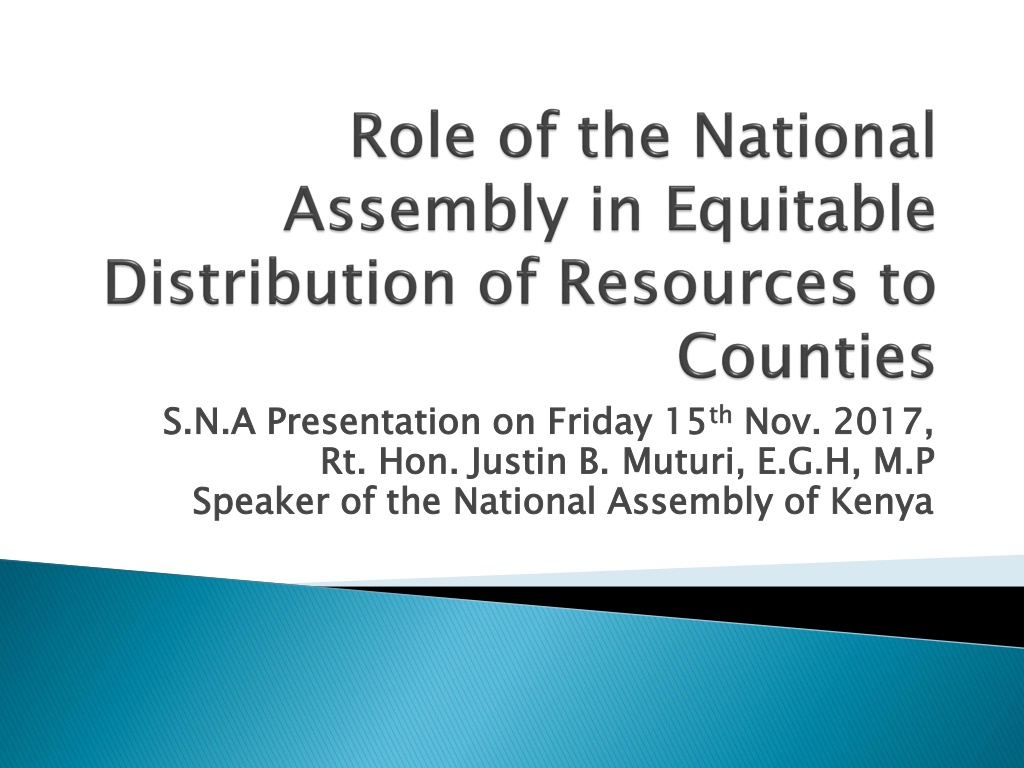
 undefined
undefined








